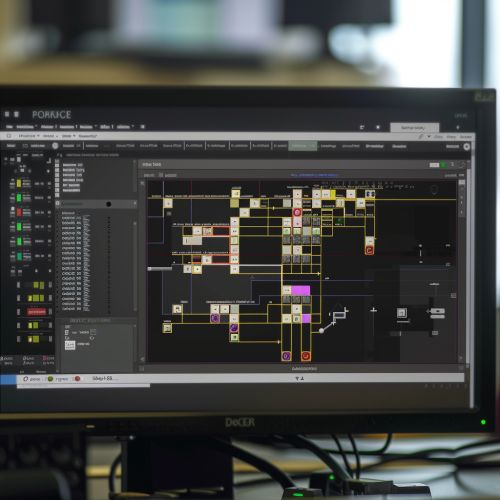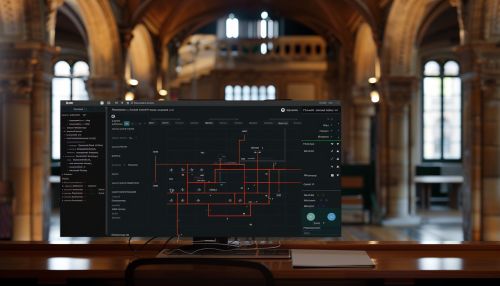Isabelle: Difference between revisions
(Created page with "== Introduction == Isabelle is a generic proof assistant, a software tool designed to assist with the development of formal proofs by human-machine collaboration. It is widely used in academia and industry for formal verification of software and hardware, theorem proving, and formalizing mathematical theories. Isabelle supports a variety of logical frameworks, making it a versatile tool for formal reasoning. == History == Isabelle was originally de...") |
No edit summary |
||
| Line 54: | Line 54: | ||
<references /> | <references /> | ||
[[Image:Detail-92417.jpg|thumb|center|A screenshot of the Isabelle proof assistant interface showing a formal proof in progress.|class=only_on_mobile]] | |||
[[Image:Detail-92418.jpg|thumb|center|A screenshot of the Isabelle proof assistant interface showing a formal proof in progress.|class=only_on_desktop]] | |||
[[Category:Proof assistants]] | [[Category:Proof assistants]] | ||
[[Category:Formal methods]] | [[Category:Formal methods]] | ||
[[Category:Mathematical software]] | [[Category:Mathematical software]] | ||
Latest revision as of 13:05, 14 June 2024
Introduction
Isabelle is a generic proof assistant, a software tool designed to assist with the development of formal proofs by human-machine collaboration. It is widely used in academia and industry for formal verification of software and hardware, theorem proving, and formalizing mathematical theories. Isabelle supports a variety of logical frameworks, making it a versatile tool for formal reasoning.
History
Isabelle was originally developed by Lawrence C. Paulson in the mid-1980s at the University of Cambridge. The project was inspired by the LCF (Logic for Computable Functions) theorem prover, and it aimed to create a more flexible and extensible proof assistant. Over the years, Isabelle has evolved significantly, incorporating various logical formalisms and improving its usability and performance.
Architecture
Isabelle's architecture is based on a logical framework known as Higher-Order Logic (HOL). It also supports other logics such as First-Order Logic (FOL) and Zermelo-Fraenkel set theory (ZF). The core of Isabelle is written in Standard ML, a functional programming language that provides robust support for formal reasoning.
Logical Framework
The logical framework of Isabelle allows users to define their own logics. This is achieved through a meta-logic, which is a logic used to define other logics. Isabelle's meta-logic is based on a form of intuitionistic logic, which is well-suited for representing a wide range of logical systems.
Proof Engine
The proof engine of Isabelle is highly modular, allowing for the integration of various automated reasoning tools. These include SAT solvers, SMT solvers, and model checkers. The proof engine also supports interactive proof development, where users can guide the proof process by providing hints and strategies.
Features
Isabelle offers a rich set of features that make it a powerful tool for formal verification and theorem proving.
Interactive Proof Development
One of the key features of Isabelle is its support for interactive proof development. Users can incrementally build proofs by applying tactics, which are high-level proof steps. Isabelle provides a wide range of tactics for different types of reasoning, including induction, case analysis, and simplification.
Automation
Isabelle integrates various automated reasoning tools to assist with proof development. These include automated theorem provers, decision procedures, and symbolic computation tools. The automation capabilities of Isabelle significantly reduce the effort required to develop complex proofs.
Formal Verification
Isabelle is widely used for formal verification of software and hardware systems. It provides a rigorous framework for specifying and verifying system properties, ensuring that systems behave as intended. Isabelle has been used to verify critical systems in various domains, including aerospace, automotive, and security.
Formalization of Mathematics
Isabelle is also used for formalizing mathematical theories. It provides a rich library of formalized mathematics, covering areas such as algebra, calculus, and number theory. The formalization of mathematics in Isabelle ensures that mathematical proofs are rigorous and free of errors.
Applications
Isabelle has a wide range of applications in academia and industry.
Academic Research
Isabelle is extensively used in academic research for formalizing mathematical theories and developing new proof techniques. It is also used in teaching formal methods and logic, providing students with hands-on experience in formal reasoning.
Industry
In industry, Isabelle is used for formal verification of software and hardware systems. It is particularly valuable in safety-critical domains, where rigorous verification is essential. Companies use Isabelle to verify the correctness of system designs, ensuring that they meet specified requirements.
Community and Development
Isabelle has a vibrant community of users and developers. The development of Isabelle is coordinated by the Isabelle Development Team, which includes researchers and practitioners from various institutions. The community contributes to the development of Isabelle by providing feedback, reporting bugs, and developing new features and libraries.
Future Directions
The future development of Isabelle aims to further enhance its capabilities and usability. Key areas of focus include improving the integration of automated reasoning tools, enhancing the user interface, and expanding the library of formalized mathematics. The development team is also exploring new applications of Isabelle in emerging domains such as quantum computing and blockchain technology.
See Also
References


